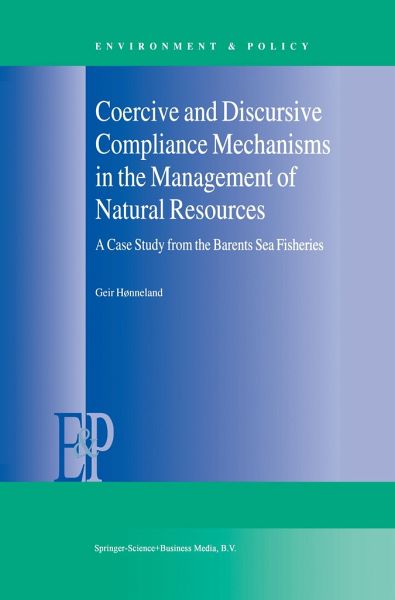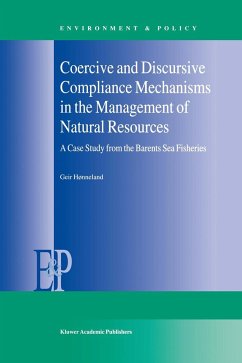
Coercive and Discursive Compliance Mechanisms in the Management of Natural Resources
A Case Study from the Barents Sea Fisheries
Versandkostenfrei!
Versandfertig in 6-10 Tagen
76,99 €
inkl. MwSt.
Weitere Ausgaben:

PAYBACK Punkte
38 °P sammeln!
This book is the result of more than a decade's preoccupation with the issue of compliance in the Barents Sea fisheries, first as an interpreter in the Norwegian Coast Guard, then as a graduate student at the University of Troms0, and finally, as a PhD student at the University of Oslo and a research fellow at the FridtjofNansen Institute (FNI). Many of those who deserve a "thank you" in this preface have already been properly thanked on other occasions, among them my previous colleagues and superiors in the Norwegian Coast Guard. On the present occasion, I would particularly like to extend my...
This book is the result of more than a decade's preoccupation with the issue of compliance in the Barents Sea fisheries, first as an interpreter in the Norwegian Coast Guard, then as a graduate student at the University of Troms0, and finally, as a PhD student at the University of Oslo and a research fellow at the FridtjofNansen Institute (FNI). Many of those who deserve a "thank you" in this preface have already been properly thanked on other occasions, among them my previous colleagues and superiors in the Norwegian Coast Guard. On the present occasion, I would particularly like to extend my thanks to the FNI leadership during my time here for giving me the trust and freedom to pursue my enthusiasm. Many other colleagues at the institute, from both the research and the administrative staff, have contributed to the present work. For fear of forgetting someone, I prefer not to mention names. There have to be a few exceptions though: From the administration, I would particularly like to thank Kari Lorentzen for her professional help in the library, and Ann Skarstad and Anne-Christine Thestrup for language assistance. Thanks to Claes Lykke Ragner for producing the map on page 7, and to Ivar M. Liseter for help in the preparation of camera-ready copy. Among the research staff, I would mention my long-standing fellow student and colleague both in the Coast Guard and at the FNI, Anne-Kristin J0rgensen.














